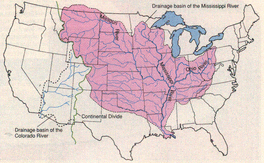 Have any of you heard of the Gulf of Mexico hypoxic zone? I know I sure have and what I heard made me so concerned that I did a paper and a presentation on it in my Wetland and Riparian Ecology class on the very subject. For those or you that don't know anything about the hypoxic zone in the Gulf of Mexico please read on and I will do my best to inform you on the very subject. According to the U.S Geological Survey the definition of Hypoxia is as follows, Hypoxia – “Hypoxia occurs … when oxygen concentrations fall below the level necessary to sustain most animal life. Hypoxia results when oxygen consumption, primarily through decomposing organic material, exceeds oxygen production through photosynthesis and replenishment from the atmosphere.” - Mississippi River/Gulf of Mexico Watershed Nutrient Task Force, 2004 While not the most detailed of definitions it strikes right to the heart of the matter. With a lack of oxygen present in the water aquatic life can no longer be sustained in that location which forces the local fauna to either relocate or perish. This can be a huge issue in bodies of water ranging from your local swimming hole all the way to the worlds oceans. This issue affects alot more than just the life in the water but it also effects life on the land, mainly us. The reason behind this is the impact to commercial fishing and local tourism when all the aquatic life either dies or goes away. Fishermen in the Gulf have suffered extreme economic hardship because of this phenomenon which is a ongoing problem and not one that can be easily cleaned up. How does it occur? Well as according to the definition above it occurs when oxygen levels drop below sustainable levels because of excessive consumption by decomposers. But that just leads us right into another question of what is all this stuff that is decomposing. Well its mainly your run of the mill algae and zooplankton that grow to feed on all the algae. Just to clear up one thing algae and zooplankton blooms are nothing new to the Gulf. They have been occurring for a very long time and there is only one thing that has changed in recent history which has caused the rash of hypoxia. I'm sorry to say that it is us, human beings once again shooting ourselves in the foot by not thinking about what exactly we are doing. http://astro.wsu.edu/worthey/earth/html/md14.html How are we doing it? We are doing it with all of the nutrient rich runoff that is being dumped into the Mississippi River drainage system. The same system that contains some of our most heavily used agricultural land such as the Corn Belt our industrial base and a much of the U.S. population. All of these factors add up into a perfect storm of nutrients that get dumped into the system. These nutrients come from over application on farm fields, industry dumping with out proper filtration and the growing use of commercial lawn fertilizer that is applied by Joe Citizen in his quest for the perfect green lawn. What do all these nutrient do? The nutrients do exactly what they are made to do, fertilize. The problem is they are not providing nourishment to crops or your lawn and garden but are instead causing a glut of algae to grow in the Gulf which far exceeds any natural algae bloom in size. Then when their life cycle is complete these algae and zooplankton die and they start to decompose using up oxygen in the water, causing hypoxia. What can be done? A two pronged attack is key to mitigating this problem. We must educate the general public in the facts about hypoxia so they are made aware and secondly we must change how we go about managing our waste and fertilizer. Education can and should be done through,
Not only must be educate people we must change how we manage our waste and nutrients through a variety of ways including,
I just mention a few of the possibilities because the sky is the limit for what can be done to reduce the impact we have on the Gulf of Mexico and the local communities there. So if you live in a area of the country that drains into the Gulf do your best to be a good steward and support local wetland groups and refrain from lawn fertilizer and other nutrient rich wastes. If we all do what we can to lessen our impact to this and many other issues that face the natural world we just might make a difference yet.
0 Comments
Leave a Reply. |
AuthorHello my name is Josh Larson and I am the creator of the Green Living Library. Here on the blog you will find updates to content found in the Green Living Library as well as stories from those living the sustainable life already. Archives
December 2021
Categories
All
|